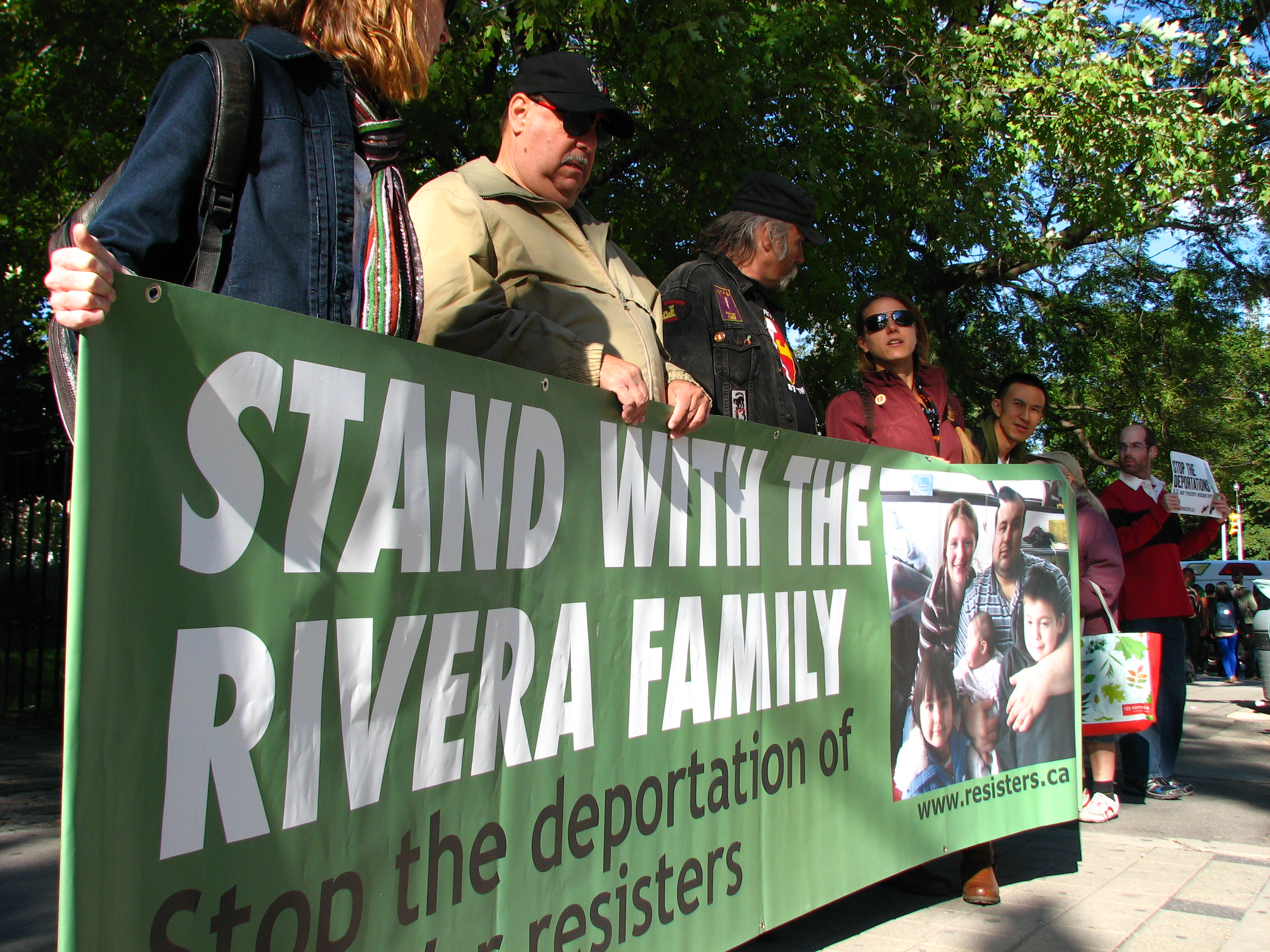Kimberly Rivera didn’t want to leave Canada. Neither did her husband or children.
But the Iraq war resister and her family didn’t have a choice in the matter.
The Canadian government rejected her claim for refugee status and refused to grant a hearing for her application to stay in the country based on humanitarian and compassionate grounds.
“Her lawyers were looking for a stay of deportation until the humanitarian and compassionate grounds was heard,” said Sid Lacombe of the Canadian Peace Alliance, Canada’s largest umbrella peace organization that works closely with the War Resisters Support Campaign.
“But the judge decided they were not going to hear it and the deportation order would go ahead.”
For almost eight years, the War Resisters Support Campaign has assisted U.S. military personnel who refused to participate in the Iraq war and came to Canada seeking asylum.
There was an incredible amount of support this week for Kimberly from municipal, provincial and federal politicians as well as prominent Canadians from across the country.
Almost 20,000 supporters signed a petition imploring Immigration Minister Jason Kenney to grant the Rivera family application to remain in Canada on humanitarian and compassionate grounds.
On Tuesday, hundreds of Canadians called the Immigration Minister pleading for him to allow the Riveras to stay in this country.
But to no avail. However, those who support war resisters said they won’t give up.
“There are other resisters here and this fight’s not over,” said Lacombe.
“But we’ve got a government that doesn’t have ears. We’re going to have to mobilize in a much more significant fashion around the other upcoming cases.”
That won’t be easy considering the Harper government has already ignored two motions passed in Parliament granting U.S. war resisters asylum in Canada as well as the court rulings in previous cases.
Lacombe spoke with Kimberly a couple of days ago and said she was “remarkably calm” under the circumstances.
Once she crossed the border into the U.S., Kimberly was taken into custody, separated from her family and could spend years in a military prison.
Although some war resisters have managed to avoid prison sentences, those who have publicly spoken out against the war typically serve 18 to 24 months in prison.
“And that’s been one of the central legal points of this campaign,” said Lacombe. “It’s not simply a prosecution. It’s a persecution for standing up and saying no to war.”
On Wednesday afternoon, over 100 supporters assembled outside the federal court in Toronto for a Day of Action to halt the deportation of the Rivera family.
Similar actions were held in Waterloo, Hamilton, London, Halifax and Vancouver.
In Toronto, Kimberley Ford stood on the north side of Queen Street with other supporters, holding up her section of a banner that read “Don’t Deport War Resisters.”
“I am heartbroken, saddened and sickened to be a Canadian today,” said Ford, who’s known the Rivera family for four years.
“She’s one of the most gentle, self aware, unconditionally loving, generous people that I’ve ever met.”
Tammy Miller, also a close friend of the Rivera’s came out to Wednesday’s rally with her one year old son and partner.
She couldn’t believe the Canadian government could be so heartless as to do something that would separate a mother from her children.
“Our government doesn’t recognize that people can develop a conscience while serving in a war,” said Ginny Walsh, another supporter at Wednesday’s Day of Action.
Yet the U.N. Commission on Human Rights recognizes the right to become a conscientious objector after joining the military.
“She’s been courageous to take a stand and Canada should be courageous enough to provide asylum for her,” said Marjie Calla, standing beside Walsh.
In her eyes, Kimberley is a hero.
“She stood up for what she believed in even though she knew that things could happen to her.”
Doug Johnson, a street pastor who lives in the same neighbourhood as the Riveras, said there were lots of hugs and tears on Wednesday afternoon when Kimberly came to bid farewell to her children at school.
Two of Rivera’s children and Johnson’s middle son attended Queen Victoria Public School in Parkdale.
“A terrible moment to watch while a couple of children are taken from their mother,” said Johnson.
“Just because she decided in the middle of a war zone to stop carrying a gun because she didn’t want to kill other people’s children.”
Johnson continued to be amazed at the buoyancy of Kimberly under the stress of the last few weeks.
“And still have a glow about her, a smile,” he said.
Seven years ago, when Johnson moved to Canada from the Unites States, he thought he was moving to a cold country with a warm heart.
“But Canada has decided to put the politics of oil first.”
Johnson said a culture exists in the U.S. that glorifies war and the military. “And then one day, you wake up in the middle of a war zone and realize what you’re doing,” he said.
Were it not for Johnson’s childhood asthma, he’d have ended up in the military too. His grades were good and he was headed for a career in the air force.
“I hated having asthma as a kid,” said Johnson. “There were nights I thought I was going to die, unable to breathe.”
But now he’s thankful for the asthma.
“Otherwise, I could have been bombing and ruining other people’s lives,” he said.
Johnson pointed out that it’s the huge signing bonuses (as high as $80,000 for some high demand specialties) that push young people coming from economically disadvantaged areas to seriously consider a career in the military.
Universities and high schools are pressured to allow recruiters on-campus or risk losing their federal funding.
“As soon as you put your name on a list to allow the military to send you more information, the recruiters are just hounding you,” said one war resister.
“And they make it sound so glamorous.”



